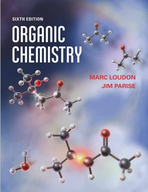Ethyl vinyl ether, EtOCHCH2, hydrolyzes in weakly acidic water to acetaldehyde and
Chapter 22, Problem 22.92(choose chapter or problem)
Ethyl vinyl ether, EtOCHCH2, hydrolyzes in weakly acidic water to acetaldehyde and ethanol. Under the same conditions, diethyl ether does not hydrolyze. Quantitative comparisons of the hydrolysis rates of the two ethers under comparable conditions show that ethyl vinyl ether hydrolyzes about 1013 times faster than diethyl ether. The rapid hydrolysis of ethyl vinyl ether suggests an unusual mechanism for this reaction. The acetaldehyde formed when the hydrolysis of ethyl vinyl ether is carried out in D2O/D3O+ contains one deuterium in its methyl group (that is, DCH2CHO). Suggest a hydrolysis mechanism for ethyl vinyl ether consistent with these facts. (Hint: Vinylic ethers are also called enol ethers. Where do enols protonate? See Eq. 22.17b on p. 1112.)
Unfortunately, we don't have that question answered yet. But you can get it answered in just 5 hours by Logging in or Becoming a subscriber.
Becoming a subscriber
Or look for another answer
